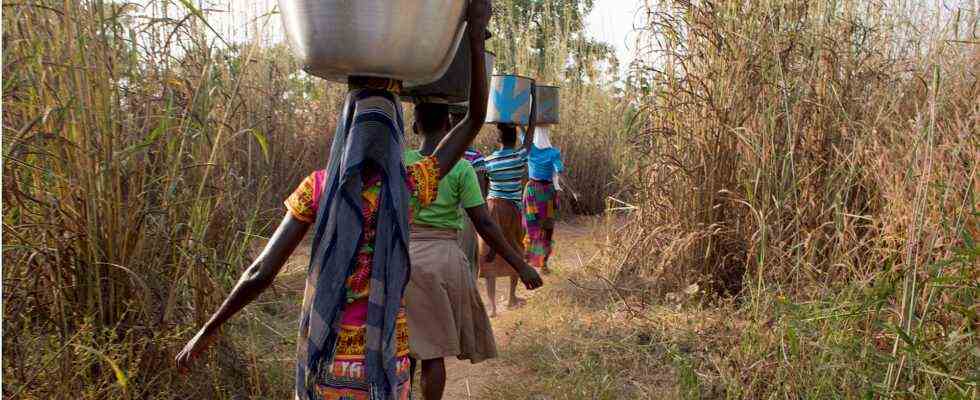Status: 10/30/2021 7:00 p.m.
The people in Ghana often suspect witchcraft behind illness, drought or fire. Women are therefore persecuted and threatened. They find refuge in so-called witch villages. But these are threatened with closure.
Only God saved me, they almost killed me. They came with a gun and threatened to kill me. And when they dragged me away from church, someone took out a knife and said they’d better butcher me. And that’s how I came here.
This is what Kologo Tingana says. The 71-year-old woman has lived in the village of Gambaga, in northern Ghana, since 2016. Gambaga is considered a witch village – a kind of ghetto for exiled women. 87 women currently live there. It was not until the end of October that three more fled to the village.
Witch Village’s last refuge
Hundreds of women, mostly elderly, accused of witchcraft by relatives or members of their community live in such witchcraft villages in northern Ghana. In these camps, women and children live under sometimes precarious conditions and with little hope of a normal life. The charges against them: illness, drought, fire or appearing in nightmares. Some say they were denounced out of envy because they were successful as business women.
Something similar happened to Kologo Tingana. She was accused of witchcraft after customers couldn’t pay for their farm produce, she says. So they claimed she was a witch so as not to have to pay. The community mob was quick to kill them, says Tingana. She fled. In 2020, a 90-year-old woman was reportedly lynched by a mob in Ghana. Kologo Tingana is still afraid of it.
“They’re criminals”
“I am unhappy and cried when the old woman was killed,” she says. “Those are criminals who did that. The government has to do something or they will kill us all!”
Samson Laar wants these women to leave the witch villages. His Christian non-governmental organization “Presby Go Home Project” tries to support women. But just providing them with safe accommodation is difficult. The women, often older, sleep in mud huts. There are no beds. They sleep on mats that they place on the clay floor. One of many problems. Laar says the majority of women want to go home, but most communities are just not safe enough for them.
The camps are threatened with closure
“The condition of the villages is very bad,” continues Laar. “The women are in a poor condition because at the moment we don’t even have food for them. It is a big problem for us to provide them with food. Only yesterday new women came to the camp because a pastor taught them witchcraft accused. How barbaric! “
The effects of the corona pandemic may also have led to women being held responsible for death and illness. This superstition, with sometimes fatal consequences, is well known to the Ghana’s government. Years ago she had announced that she wanted to close all the witch villages.
In 2018, for example, the then Minister for Gender, Children and Social Protection, Otiko Djaba, said that the reports of alleged witches who were being banished were appalling and disturbing. But the ministry will close all witch camps, she fears.
Many fear their home
“We visited the witch camp in Gambaga,” says Djaba. “And our goal is to support the women through training and we try to reintegrate them through discussions between the communities and the alleged witches. Nevertheless, some of them do not want to go back to their communities because they fear that as soon as something bad is there happens that they will be the first to be accused. “
But to this day, six witch villages are known in Ghana. In very remote parts of the country there are said to be even more that are not officially known or documented. The belief in witchcraft is deeply rooted in some regions of Ghana, says Lamnatu Adam from the women’s rights organization Songtaba. The witch villages existed for centuries.
A firmly anchored superstition
Every little dream has a spiritual meaning, according to Adam. Religious leaders do not help with the problem either – on the contrary. There are those who hold witchcraft responsible for the unfortunate and contribute to the problem. “We have churches that practice exorcisms and only speak of witchcraft when someone is unsuccessful,” continues Adam. “There is a serious and ingrained belief in witchcraft, so the allegations still go on.”
On the one hand, the problem lies in superstition – women who have been accused often have no protection from police officers because they themselves believe in witchcraft. On the other hand, says Adam, it is also due to the lack of respect for women’s rights.
The numbers give hope
If you look at who is commonly charged, it’s women. Many disapproved of human rights to women, as if you can do anything with women and get away with it. Ironically, even with belief in witchcraft, there is a problem of power relations, says Adam. “There is a superstition that if a man has spiritual power, he uses it to protect his family and his community – a woman, on the other hand, uses her powers to cause damage.”
But women’s rights activist Lamnatu Adam also sees positive developments. According to her observations, there are fewer women in the so-called witch villages. Once there were thousands of women, today around 300 women still live in these accommodations. But for many of them, even after decades, the witches’ village remains the only place of refuge.
Banished because of disease, drought and fire: witch hunt in Ghana
Dunja Sadaqi, ARD Rabat, 10/30/2021 4:57 p.m.

